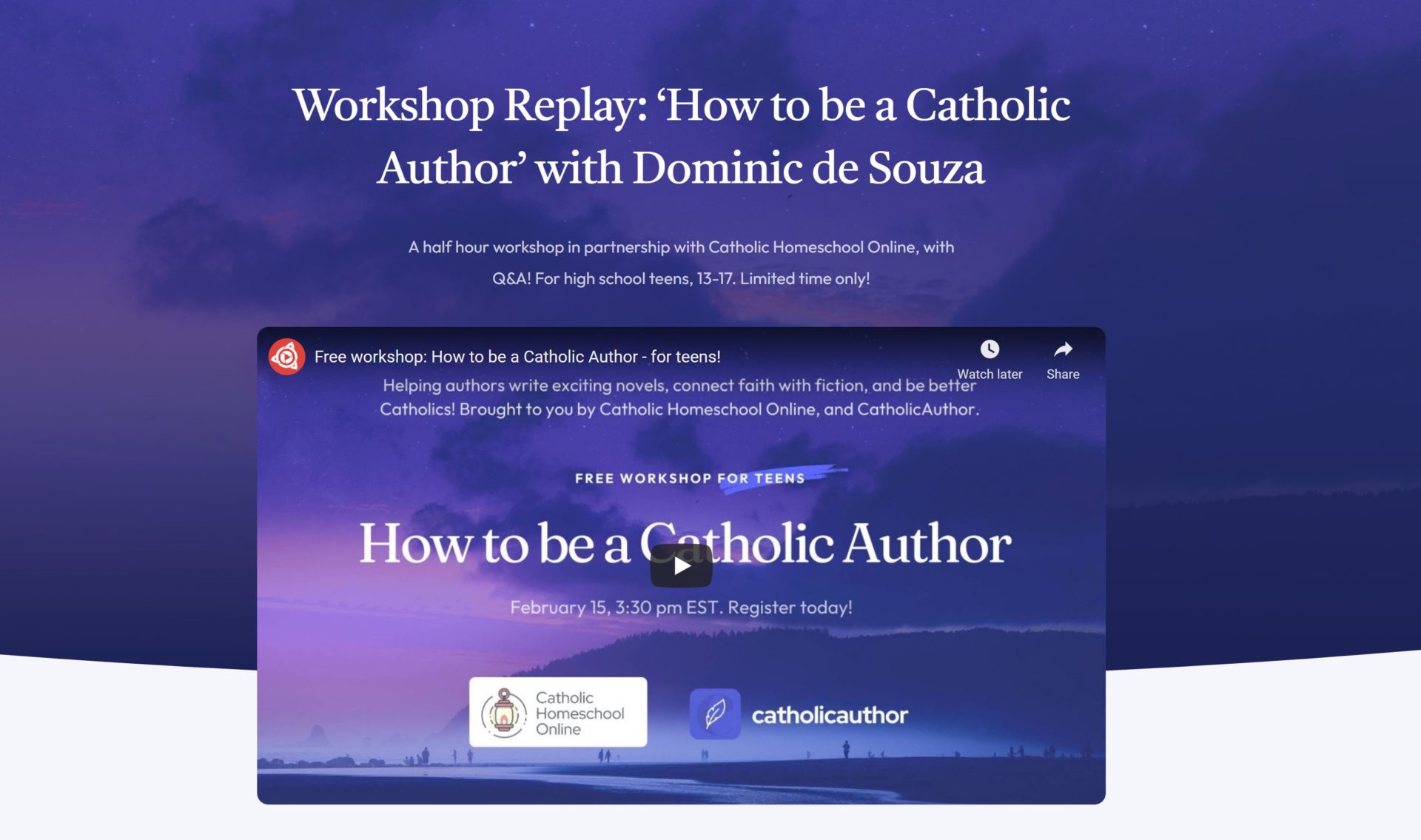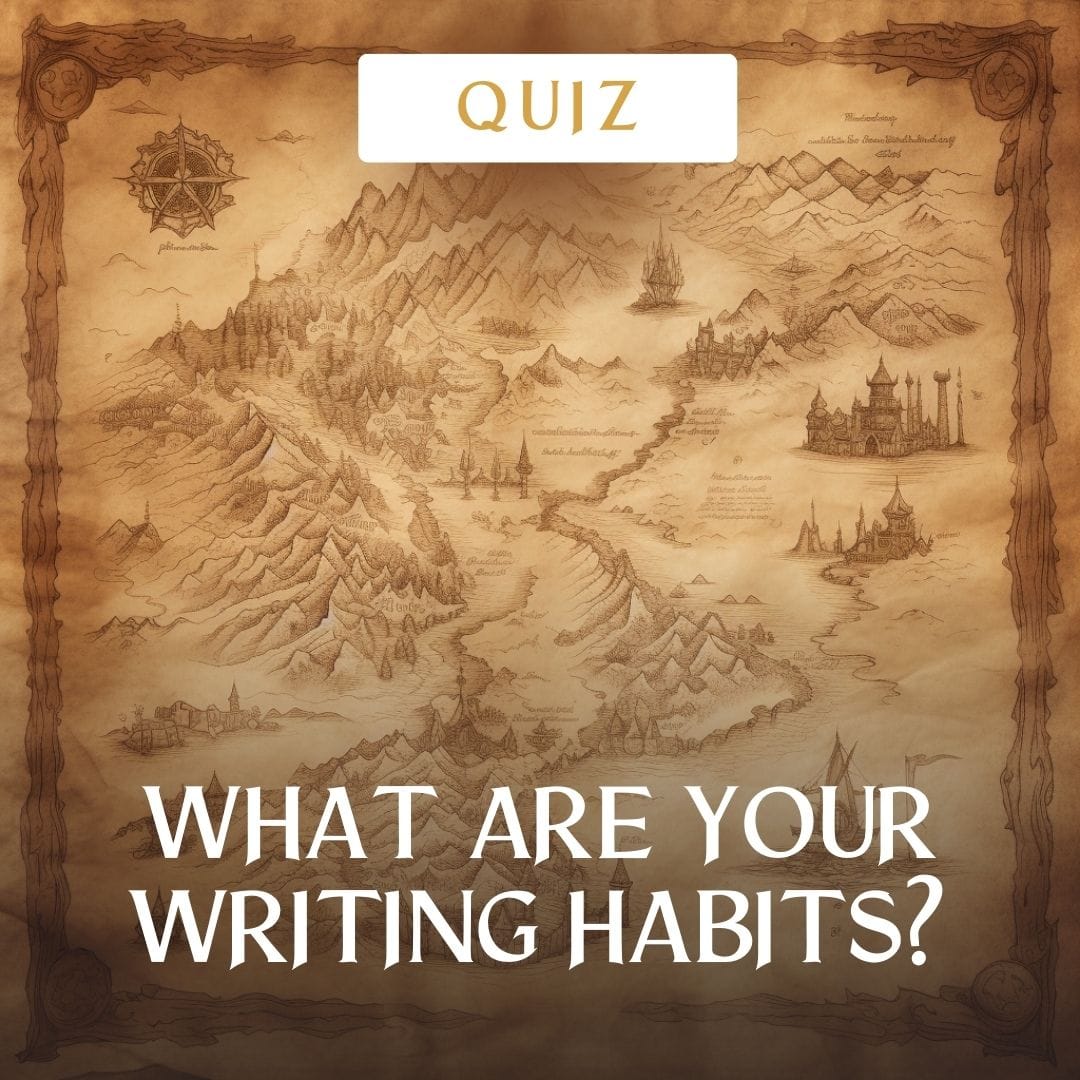Hi there! Thanks for watching the workshop ‘How to be a Catholic Author’, partnered with Catholic Homeschool Online.
You can check out the replay on this workshop for a limited time here →
During our livestream, a number of good questions came in about being Catholic, about writing, and my own writing journey. As promised, here are the responses! Got more? Comment below!
They’re organized in three groups: faith and fiction, self publishing, and personal questions.
And with each question, you’ll have your own answer – share it with us too!
Q: How do you line up Catholic morality with your story?
So let’s break that question down into its parts, first.
First, our Catholic faith is gifted to us, and it takes time, prayer, and active relationship with God to live it out. It is both a tradition, and a truth that we embody in every generation. It is something that is renewed all the time – but it is not ours. We are receptive to reality, and responsible to it.
When you say ‘morality,’ I’m pretty sure you mean ‘Christian truths, and our Christian values.’ Morality within our Christian context means ‘the cultural expression of our faith and values that we commonly agree are important.’
Morality comes from ‘morals’, shared values. It evolves over time. Christian morality has changed across cultures and time. It is something we regularly renew, refine, and resolve. This is true in different cultures, religions, times, and even different families.
Your story is already an acting out of the morality you have been born into, gifted with, or accepted. Some cultures have deeply entrenched moral cultures that aren’t very Christ-like at all. Some work very hard to be. You are automatically writing from that moral space. It’s already there.
So I think the real question is – how do you make your story more real, more true, and a better expression of reality? With or without Christ Jesus being explicitly mentioned? Your characters will be already struggling or surviving based on how you see the world. Are you seeing it correctly?
That answer comes with your own self-reflection. With study, patience, prayer, and the self-awareness that can come. You have to find out who you are, and what you’ve inherited from others, and see how it squares with the revelations and guidance our Church brings us.
We’re all on that journey. :)
Q: What is your favorite way to put the Catholic faith into your stories?
For me, I don’t ‘put’ it in. My understanding of what is the Catholic faith is already present. It’s like when you drive a car, or ride a bike.
If you stop and look down at the details of what you’re doing, suddenly you realize what you do and don’t know. But after you’ve learned the ‘rules,’ they become instinctive. You don’t have to worry about them as intently, because you’re focusing on the reason why the rules are there.
So a better question is to ask yourself, what of my faith am I already putting into my stories? Who are my characters, what are the quiet ‘rules’ of morality that drive who they are? What is the world that they live in, and where are they falling short?
The more you learn about our faith, and the more you live it, the clearer these answers will be. The easier it will be to understand why characters fall short, and what stories they will tell themselves about how to be good.
Sometimes it’s fun to put parishes, and priests, and sacramentals right in there. It’s valuable to write stories that reinforce our cultural lifestyle. Just remember that our cultural traditions are just that. Ours. Being Catholic in India is very different to hinterland Russia.
But for me, I love to take distinct ideas from our Faith, and then turn them into a fantasy world to explore new aspects of that idea. Often, time and use can fixate our attention on one way to think about things. Fiction is a way to shake an idea loose and turn it over, and see a truth from new angles.
Q: Where you guys get your inspiration from for stories mostly?
Reading. Lots of reading. Watching lots of movies and series. Video games. Conversations. Life.
And research. The more you know about how people live and think in different places and times, the more story ideas you get.
I like to spend plenty of time on Pinterest when I’m brainstorming an idea, and I build boards for all different aspects of my worlds. Characters, locations, scenes. There’s a lot of stunning concept art out there, and it can really inspire you.
Q:
If you want to. Screenwriting is a special discipline. It’s very different to writing novels. The same groundwork is present, but they are written for a different medium.
If someone is make progress in their writing, they should evaluate if they enjoy trying other styles and genres. If they don’t, then focus on getting better at the area that brings the most enthusiasm. That’s often the key. Test, but don’t dilute your energy. Hold fast to what seems to work.
It would be unfortunate to burn out or lose the ability to move at all because we have spread ourselves too thin to focus.
Q: How do I focus on one thing? So many of them!
Having lots of interests can be a blessing, and a curse! I’m a chronic starter of new things. It’s also called ‘shiny object syndrome.’ I find that in time, the projects that are truly important and meaningful to me come back. They keep re-emerging, and demanding time.
Keep notebooks, or documents, and write down the ideas. It can be good to have a constant source of flow with your creativity. Don’t be afraid of it. If you can, try to set a schedule. That’s a way to take our firecracker imagination and bring it into focus, like a blowtorch.
I once gave myself a challenge to write a post a story every Saturday morning. Each story was easily 3000 words or more. Setting that date with myself gave me a focus all week, thinking ahead, brainstorming ideas, discarding possible outcomes.
Then, when the morning came, I knew what I wanted to write because I’d been productive with my non-writing time.
Q: How do you get to this course?
Right here! – If you’re a teen, join the CatholicHomeschool Online community and check it out there.
Q: I
No, it’s relatively easy. :) I used Amazon’s self-publishing service several times for my novel, or a coloring book. You can Google many more options that are available.
Anyone can self-publish. All you need is a cover graphic, and a Word document. It can be incredibly fun to print off a few copies of your story collection, or your novel, and gift it to friends and family. Not everyone needs/wants to be a runaway bestseller.
The real challenge – if you do want to have plenty of readers – is promotion. Marketing. That’s a completely different question.
No, you don’t need a publishing company to self-publish. You can privately set up your book with any of the self-publishing sites out there. Then build a free website for yourself as an author, and link to your book.
A publishing company would exist for more than yourself. If you wanted to help other people get published too. That’s a different question.
Self-publishing is fantastic for a few reasons: you can move at your own pace, you can do what you want with your book, and you can keep all your royalties. The downsides is a lack of promotion. You’ll probably also need to hire your own editor, design your own cover, and ensure your book is set up properly.
Publishing exists to solve all those problems. You give up some control of your book, the royalties are much less, and the publisher often handles setup, layout, editing. Some publishers will also provide a promotional burst. Or it can be good marketing for you to have your name and book associated with a particular brand.
Many small publishers today will only help you get your book online, and provide a way for people to buy it. They don’t do any promotions worth speaking of. It can be nice to work with someone like that, but you will need your own plan for marketing and getting the word out.
Q: How do you do your covers of your books when you self publish?
Well, I’m a designer, so I create my own. You can explore websites like Canva for free templates. Or Damonza is a site I’ve never used, but creates cool art. You can also hire someone from Fiverr who’s style you like.
Obviously, hiring a real designer or an artist helps you book stand out best, and create a magical first impression.
Q: Does a graphic designer use a lot of math? Is it a good job?
There are a ton of ways to be a designer. I absolutely love it, and I am also absolutely terrible at math. So the way I am a designer doesn’t involve a lot of math.
It’s an excellent job if you are artistic, but being a designer is not about art. I’m not an artist. I am a communicator. I help other people communicate their ideas, their vision, their words. My job is to understand the ‘meta’ level of their work, the feelings, the personality types, the goal of their business. And then turn that into content that inspires other people to take action.
It’s about communicating with clarity.
Yes! I love Redwall. I think I’ve read 90% of all the books. I plan on reading them all to my little girl.
Q:
The next one. :)
I have written 2 books, but they’re both from when I was much younger. My style and interests have greatly changed since my teens, but I will say that the sequel to the first book was a fast favorite. Because much of the original heavy lifting was done on the first book, I was able to write out a sequel very quickly. It felt like it wrote itself, with little effort.
All the effort (of course) went into editing…
Q: How many books have you written? Could you tell us a few names of them?
I’ve self-published the one book I wrote in my teens. It is called the ‘Ring of Fantasy.’ I recently read it aloud to my little daughter, and realised how much I want to go back, rewrite, and expand the story and the world.
I wrote a collection of stories that I plan to turn into a book, all about a time-travelling saint and his guardian angel who slip backstage into the different miracles of history. You can see them here. (They all need editing… be kind!)
The other books I won’t yet mention, because they’re all in planning stages. :) But they’re all fantasy and science fiction, or set in a version of our real world.
Q: W
Check out this post here.
Q: What is some of the worldbuilding you have done?
That’s a massive question! Every novel I plan and work on has huge amounts of world building. I love to think about cultures, magic systems, and the theologies of these peoples. If my ideas aren’t clear enough for notes, then I spend plenty of time in Pinterest, seeing what ideas spark from pinning art and designs.
But I’ve build science fiction worlds of ancient peoples who travel the stars, and live an ancient religion that existed before the Flood. I’ve got a forested world filled with mice and buried stars. I’ve dreamed up a world where a god is released from its ‘prison,’ and the whole world doesn’t know what to do with that. It’s easy to come up with ideas. It’s harder to actually get them written and shared.
Q: What was one of the most inspiring books you have read?
Among novels, my deep favorites was Narnia, especially the ‘Magicians Nephew,’ and the ‘Last Battle’. The Silmarillion was deeply special. A more adult novel is ‘Jurassic Park’ – Michael Crichton’s style rivets me.
In non-fiction, I was surprised how much I loved ‘Planet Narnia’, about the deep messages within Lewis’s work. Also ‘The Flame Imperishable’ about St Thomas and Tolkien, completely renewed my appreciation for the depth of his legendarium.
There’s a couple. :)
Q: What are the different people that you specifically write to?
My audience is mostly early teens and later teens. I find that most later teens are capable of adult concepts and realities.
Most of my novels that I’m working on are for these older ages. Some stories will be younger.
How would you answer some of these questions? Comment below.





0 Comments